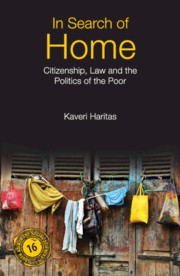1 - Introduction
Published online by Cambridge University Press: 24 July 2021
Summary
Rehabilitate: to return someone to a good,healthy, or normal life or condition after they have been in prison,been very ill, etc.; to return something to a good condition;
(Cambridge Dictionary)In November 2012, the chief minister of Karnataka handed over rehabilitation homes to the residents of the Ragigudda slum, in south Bangalore. In his address he stated:
Our priority is to make Karnataka slum-free. We want to clear the existing 2,251 declared slums in the state, rehabilitate the residents and ensure that new slums do not come up…. We want to rehabilitate these people and improve their living conditions. (The Hindu 2012)
In the southwest of Bangalore, in Laggere ward lies one of Bangalore's largest slum rehabilitation areas. Spread over 54 acres of land in the periphery of Bangalore, this area is home to the rehabilitated poor – those evicted from slums and settlements in the city. This large tract of land on which four–five storey apartment buildings are constructed is divided in the middle by the outer ring road that connects all the major highways in Bangalore city. During my research, I would take the ring road from south Bangalore where my family resides to cut across to the southwest. On this road from south Bangalore to the west, one can see the scenery change from the city-like landscape with homes, buildings, shops and bus stops to a more sparse landscape. Near the Laggere bridge enroute to the Peenya road, the landscape again changes drastically with land on both sides of the road rising high, hutments on the ridges and waste spilling down to the sides of the road. The garbage is piled up so high that it appears as if these homes are built on piles of garbage. At the Laggere bridge and beyond lie densely built apartment buildings that flank both sides of the road. These are the Laggere rehabilitation homes, commonly called the ‘slum quarters’.
Laggere housed around 4,000 families in 2009 when I first visited it. Between 2009 and 2015, I witnessed the construction of 33 new buildings in part of the area, each housing 25–30 families. Poorly constructed buildings show signs of dilapidation very soon, with crumbling walls, leaking roofs and sanitary pipes spilling into walls.
- Type
- Chapter
- Information
- In Search of HomeCitizenship, Law and the Politics of the Poor, pp. 1 - 29Publisher: Cambridge University PressPrint publication year: 2021

